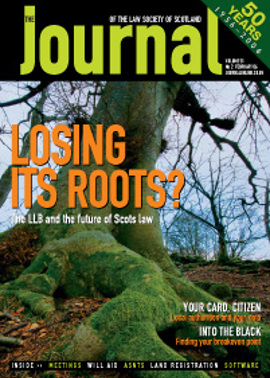The art of cashing in

A new intellectual property right, the resale right, will soon become part of UK law. The resale right (also known as the “droit de suite”) comes about by virtue of regulations to be adopted shortly by the UK Parliament which, in turn, implement Directive 2001/84/EC on the resale right for the benefit of the author of an original work of art (the “Directive”).
The Artist’s Resale Right Regulations 2006 (“the Regulations”) ought to have come into force on 1 January 2006. At the time of writing, they are, in fact, expected to take effect imminently. Although new to the UK, the resale right has existed for some time in many EU member states. The Regulations give artists (and their successors) a right to receive a payment on the sale of their works following their first transfer. A resale right applies for as long as an artist’s work is protected by copyright.
The Regulations apply to works of “graphic or plastic art [the term applied to shaping or modelling, carving and sculpture]”. A non-exhaustive list of such works is set out in the Regulations. These include paintings, drawings, pictures, collages, engravings, prints, lithographs, sculptures, tapestries, ceramics, glassware and even photographs. Copies of such works do not qualify for a resale right unless limited in quantity and made by or with the authority of the author.
Limits on the right
To qualify as a “resale” an art-market professional must be involved in the transaction (i.e. private sales between individuals are excluded) and a minimum price of 1,000 euro must be paid. Whilst the Directive permitted a threshold of 3,000 euro below which the resale right would not apply, the UK Government opted for the lower minimum for the benefit of lesser known artists.
A sliding scale of royalties applies based on the net sale price of a work. At the upper end a royalty of 4% is payable on sales from 0 to 50,000 euro, whilst at the lower end a royalty of 0.25% is payable on sales in excess of 500,000 euro. There is, however, a maximum amount payable as royalties are capped at 12,500 euro on each sale. The Regulations do not apply to works sold for 10,000 euro or less and which were acquired directly from the author less than three years before the resale. It is hoped that the decision of the UK Government to sanction this carve-out (something made optional by the Directive) will persuade art houses to continue their support of up-and-coming artists.
Not transferable
A resale right is personal to the author and his successors. It can neither be assigned nor waived, nor is it possible to grant any form of security over a resale right. A resale right may, however, pass to the Crown as bona vacantia where there are no heirs to a qualifying work.
Only individuals of certain nationalities (namely EEA nationals and those of countries specifically identified in the Regulations which make reciprocal resale rights available to EEA nationals) and qualifying charitable bodies are entitled to exercise a resale right.
The Regulations introduce a compulsory collective management scheme for resale royalties. A holder of a resale right is also granted the right to obtain information relating to a sale from an art-market professional to ensure that resale royalties are paid. Under certain circumstances art-market professionals may be held jointly and severally liable with the seller for the payment of resale royalties.
The UK Government has also decided, as permitted but not required by the Directive, to exclude from the scope of the resale right works of deceased authors until 2010 (though it is possible that this exemption could yet be extended to 2012) – the thinking being that as much time as possible should be given to the art market to come to terms with the application of the resale right. This derogation was only available to those EU member states whose national law did not previously recognise a resale right.
The commercial angle
Art houses in London fought a long, but ultimately unsuccessful, rearguard action against the European Commission’s original proposal. They were (and remain) fearful of the commercial ramifications that a resale right may have. There is a genuine concern that owners of original works of art will instead sell their works in overseas markets such as Switzerland and the US. Well established art markets operate in such jurisdictions and sales there are not subject to any resale right. In recognition of such concerns, and anxious to ensure that the UK (and London in particular) remains a leading art market, the UK Government has largely chosen to take full advantage of the exceptions and derogations permitted by the Directive. At the same time it has endeavoured to give due regard to the interests of artists. Time will tell whether the right balance has been struck.
David Gourlay, McClure Naismith
In this issue
- Legal aid in children's hearing referrals
- Still waters run deep
- Catch-up or patch-up?
- Legal science or law-lite?
- Heads above water
- Your name on file
- A welcome addition
- Another ***** meeting?
- A neglected asset
- Planning a year of action
- The Pagan mission
- A good case to read
- Jurisdiction: dispelling the myth
- That special something
- The art of cashing in
- Scottish Solicitors' Discipline Tribunal
- Website reviews
- Book reviews
- In on the Act
- Keeper's corner






